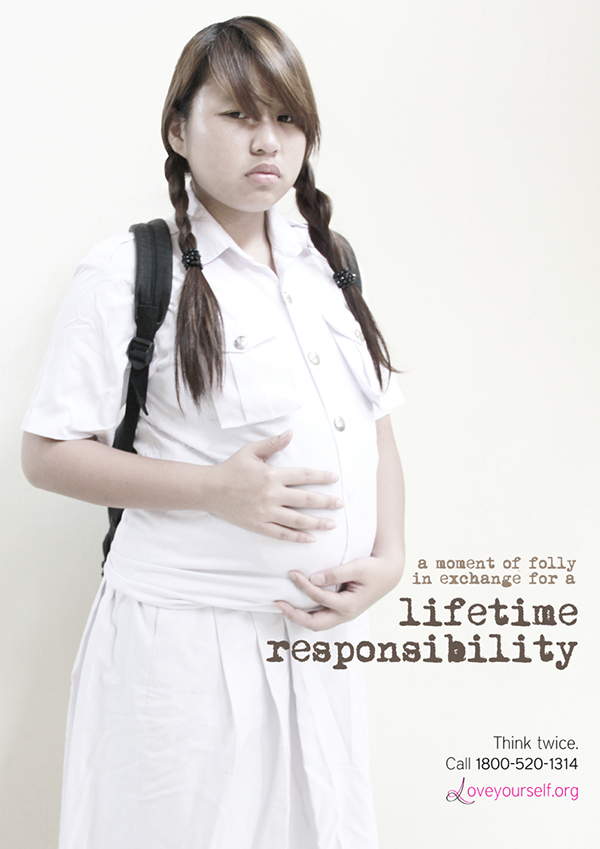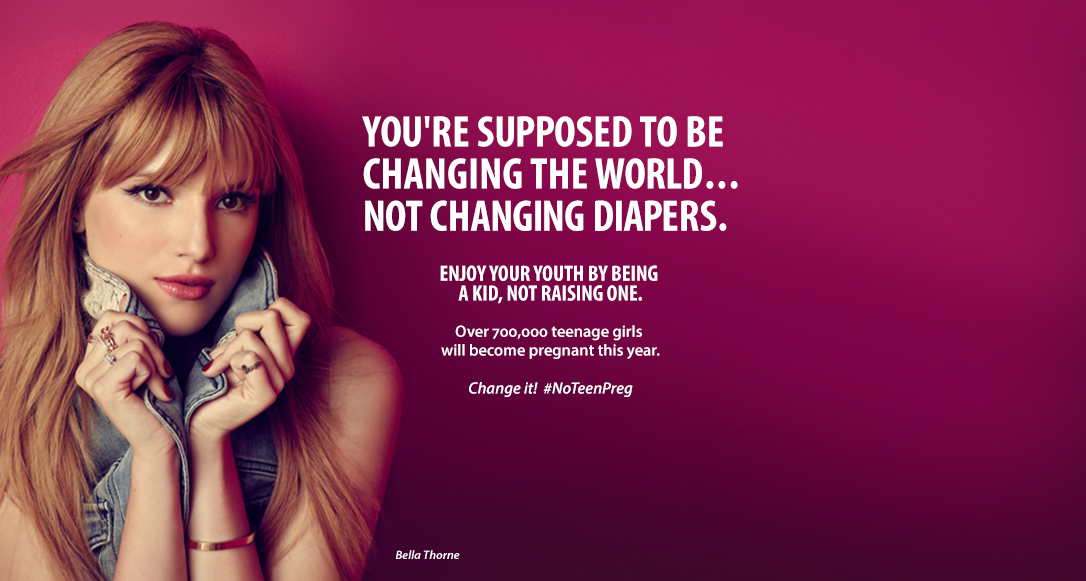
Teen Age Pregnancy A New Generation
Teen age Pregnancy is a minor problem in the society but it is a serious matter that affects not just one life but all the person around them(father,mother,child)
in just one mistake you can change your life into a world you would never expect, a total darkness you see in your future a big change you will get , think before you act to do ,Teen age Pregnancy is not an accident it is with intention not knowing the result may happen.


Unplanned but with Intention.
Over 615,000 teens between 15 and 19 become pregnant each year.
Out of all teen pregnancies, 82% are unintended. Teen pregnancy accounts for about 20% of all unplanned pregnancies annually.
Relatively few teens get pregnant before the age of 15: in 2010, 5.4 pregnancies occurred per 1,000 teens aged 14 or younger. That is, fewer than 1% of teens younger than 15 become pregnant each year.

What is Teen Age Pregnancy
Teenage pregnancy is pregnancy in human females under the
age of 20. A girl can become pregnant from sexual intercourse after she has
begun to ovulate which can be before her first menstrual period (menarche), but
usually occurs after the onset of her periods
The age of the mother is determined by the easily verified
date when the pregnancy ends, not by the estimated date of conception.[12]
Consequently, the statistics do not include pregnancies that began in women
aged 19 if they ended on or after the woman's 20th birthday.[12] Similarly,
statistics on the mother's marital status are determined by whether she is
married at the end of the pregnancy, not at the time of conception.

According to the (UNFPA), “Pregnancies among girls less than 18 years of age have irreparable consequences. It violates the rights of girls, with life-threatening consequences in terms of sexual and reproductive health, and poses high development costs for communities, particularly in perpetuating the cycle of poverty.”[13] Health consequences include not yet being physically ready for pregnancy and childbirth leading to complications and malnutrition as the majority of adolescents tend to come from lower-income households. The risk of maternal death for girls under age 15 in low- and middle-income countries is higher than for women in their twenties.[13] Teenage pregnancy also affects girls’ education and income potential as many are forced to drop out of school which ultimately threatens future opportunities and economic prospects.[8]

Being a Teen MOTHER??
Being a young mother in a first world country can affect one's education. Teen mothers are more likely to drop out of high school.However, recent studies have found that many of these mothers had already dropped out of school before becoming pregnant, but those in school at the time of their pregnancy were as likely to graduate as their peers. One study in 2001 found that women who gave birth during their teens completed secondary-level schooling 10–12% as often and pursued post-secondary education 14–29% as often as women who waited until age 30.

Early motherhood
Early motherhood can affect the psychosocial development of the infant. The children of teen mothers are more likely to be born prematurely with a low birth weight, predisposing them to many other lifelong conditions. Children of teen mothers are at higher risk of intellectual, language, and socio-emotional delays. Developmental disabilities and behavioral issues are increased in children born to teen mothers.One study suggested that adolescent mothers are less likely to stimulate their infant through affectionate behaviors such as touch, smiling, and verbal communication, or to be sensitive and accepting toward his or her needs. Another found that those who had more social support were less likely to show anger toward their children or to rely upon punishment
CULTURE FACTOR

Rates of teenage pregnancies are higher in societies where it is traditional for girls to marry young and where they are encouraged to bear children as soon as they are able. For example, in some sub-Saharan African countries, early pregnancy is often seen as a blessing because it is proof of the young woman's fertility. Countries where teenage marriages are common experience higher levels of teenage pregnancies. In the Indian subcontinent, early marriage and pregnancy is more common in traditional rural communities than in cities.
How to Prevent??


7. Discuss the Options

CULTURE FACTOR

Rates of teenage pregnancies are higher in societies where it is traditional for girls to marry young and where they are encouraged to bear children as soon as they are able. For example, in some sub-Saharan African countries, early pregnancy is often seen as a blessing because it is proof of the young woman's fertility. Countries where teenage marriages are common experience higher levels of teenage pregnancies. In the Indian subcontinent, early marriage and pregnancy is more common in traditional rural communities than in cities.
How to Prevent??

1. Have the Sex Talk
It sounds obvious, but many Circle of Moms members say that they can't emphasize enough the importance of sitting down with their daughters and sharing all the facts about sex and birth control -- information they need to make important choices about their bodies, their selves and their futures. "I plan on teaching my children about safe sex and birth control once they start learning about it in school," says Jen B. "I will let them know that they can come to us when they think they are about to become sexually active. I know that it's getting harder and harder for teens not to have sex so I plan on keeping my children fully informed on how to be safe."
Explaining birth control options is an important part of educating your teen daughter about safe sex, suggests many Circle of Moms members. "As a mom, I am already teaching my children about safe sex," says Christina M. "My 10-year-old knows what terrible diseases sex can cause and how most of them can be eliminated by just wearing a condom properly. We will keep condoms available in our home at all times while our children are teenagers because while we don't want our children to be having sex as teenagers, we know we can't prevent it. We want them to be safe."
The "talk" about safe sex should also include what sleeping with a boyfriend means emotionally to your daughter, says Dyan B. "I would talk to them about sex and what it involves emotionally and physically, and how surprised I was myself by the emotional attachment I had to the partner after having sex for the first time," she says, adding that if her daughter still decides to have sex, she would also explain the importance of condoms and birth control. "I would completely reiterate the importance of condoms — even when on the pill. "


Numerous Circle of Moms members say it's a mom's job to inspire her daughter to care about herself emotionally as well as physically. As Sarah elaborates, "Don't just 'be there;' you have to talk to her, ask her questions, explain to her how boys her age act and why they seem to always want sex....stuff like that. I think if girls have good parents and learn to care about themselves, they might not have go looking for attention in a boyfriend, and maybe they won't make the choice of not being careful during sex. With my girls, I will teach them (and am currently teaching this to them now) that they can always come to me with any question about anything. They can always tell me their feelings about anything, no matter what. I will also teach them how to have self control...and how to say 'no' to any advances they may get from boys."
4. Encourage Abstinence
Many schools promote abstinence as the best choice, and numerous moms believe in underscoring this message with their daughters. "I will also emphasize abstinence as an option as we get into more detailed information," says Jenny C. about how she plans to educate her now seven-year-old daughter about the "facts of life." Teresa also plans to follow religious teachings on the importance of abstinence and says she will be "emphasizing how it is God's plan that they wait for marriage."
5. Lay Out the Consequences


It may sound harsh, but many Circle of Moms members say they have had to be very frank with their daughters and explain that if they get pregnant and have a child, they should not expect their moms to step up and take on the parenting responsibilities. As Dyan B. explains, "I would offer my support, but make it clear that I would not be a mother to that child." And Kellie says she would make it a point to explain the realities of living life as a teen mom. "Of course, teens do realize -- especially once they have them -- that babies aren't just cool accessories ... When you're 17-years-old, you should be out with your friends."
And Christina M. says she plans to be candid with her children about what her own life was like as a teen mom. "When my children hit the ages of 14-15-years-old, I plan on sitting them all down individually and telling them my story of being a teenage mom. I am going to reveal everything, the grief, the hardships, the loneliness, everything. I want them to know what I went through so they don't do the same thing I did."
Emma N. is another mom who suggests laying it on the line. "I would tell her that I would be very disappointed," she says. "But she would be taking responsibility, and not living in my house if she chooses to have and keep the baby. You want to act grown up and get pregnant, get your own place. "
6. Encourage Them to Gain Experience Caring for a Baby
Several Circle of Moms members offer the very practical suggestion that parents encourage their daughters to babysit as a way to prevent unwanted pregnancies. "I did a lot of babysitting and I didn't have a baby until I was 28, and it was possibly a contributing factor to why I didn't have babies earlier," says Nikki S. "I had no life from about 10 to 16 because my mom and dad had three babies during that time and she was really sick so I did everything for them, including all the house work and dinner, for six years. I think the reason I had no interest in babies is ... because I wanted my own life and to have some fun first."

7. Discuss the Options
Some Circle of Moms members say the best way to stave off an unwanted pregnancy is to discuss what the options would be if their daughters did get pregnant, says Christina M., once a teen mom herself. Since any choice, whether adoption, teen parenting, or abortion, has consequences, a discussion like this can be eye-opening for a teen. Christina elaborates, "If she came to me pregnant, after I stopped yelling, I would present her with her options. Abortion is not a personal option for me, so I would never suggest it for my child, but I would give her the pros and cons of adoption and parenting. I would make her check out an adoption agency, and also sit down with another teen mom to talk about teen parenting."
Heather L. says that though she would be disappointed, she would tell her daughter that if she got pregnant, she would support her if she wanted have an abortion. "If she wanted to abort, I would help with that," she says. "If she wants to do adoption, I would help with that. And if she wants to keep the baby, we as a family would do what it takes to get her through school and on her way to a career so she could be a successful mom."
There is only so much you can do to prevent an unwanted pregnancy for your daughter, many of Circle of Moms members advise. "You can't prevent everything/anything," says Kellie B. "Our children will make their own decisions, some bad, some good. All I can do is educate her, talk to her and keep the lines of communication open...and trust her to make the right decisions for her."



To sir Meden
ReplyDeleteInstructor
Empowerment Technology